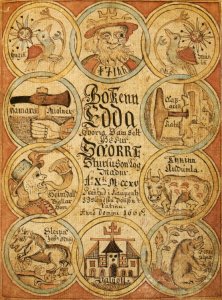You may get PTSD, but learning German is a good way to learn the grammar you forgot — or the grammar you never learned. German is as fulsome as it is fulsome in that respect, something like a built-in sentence diagram.
There are 16 ways to say “the” in German. Just as there are 16 ways to say “the” in English?
No. Each of the 16 ways in German tell you the gender, number and case of the following noun. So just IN CASE…
Having taught the language for decades I’ve found some tricks for avoiding German’s paradigms from hell, that’s what they are — and no mistake. Something they don’t tell you about until it’s too late to drop the class, I am hoping that this post serves as warning. It may be too late for me, but not for thee.

Take a look at the über busy “visual aid” to the right. It’s a genuine P-O-S in my humblest opinion — ein Stück Scheisse, ohne Zweifel.
Mark Twain learned German (Fraktur even!) and lived to warn his readers: The Awful German Language. Fraktur inventors even thought of making the letter ‘f’ nearly indistinguishable from the letter ‘s’. So that you have to recognize the damned words containing ‘f’ and ‘s’ before you can understand what you are reading? Yes.
Consider the first line that the crow below is about to peck. “This is the Leipzig Fraktur font”:
I didn’t begin learning German until becoming an adult, when I needed it to study in West Germany in 1971. Sheer good fortune found me rooming with the only German student in the building who did not speak English…
Okay, enough of that, enough of that. What’s this lesson plan you wish to share?
Before the Vikings invaded Britain, English was still inflected the Saxon (Sachsen) way. The German “chs” became the simplified “x”. They had a land to plunder, so they took the gordian option — replace all the sixteen shades of inflection for the so-called “strong endings”” from der, die, das, den, dem and des to “the” and replace all the twelve shades of inflection for the so-called weak endings” to “the” as well. Knot cut.

German inflections do not flourish in non-German soil well. Norway, Sweden, Denmark, Netherlands — all of them pretty much did away with the meaning-by-inflection technique and applied the Viking way. Similarly, the Romance languages discarded the five declensions of Latin.
The only country that retained German (Nordic Branch) was Iceland. It has maintained all four cases and three genders for a millenium. Icelandic speakers can, with a bit of effort, read the Eddas. By the way, the Icelandic word for Iceland is Island — Iceland is land, is it not?
Now then, how do those inflections work in German language? I’m calling the following lesson plan The Case of the “The” by Erle Stanley Gaertner:
- Über den Fluss und durch den Wald,
- Zu Großvaters Haus gehen wir;
- Die Pferde kennen den Weg, den Schlitten zu tragen
- trotz des dreckigen und tiefen Schnees.
- gegen den Regen und durch den Wald,
- zur Grossmutter und zum Grossvater gehen wir!
- Over [object of a preposition of relative position, accusative, masculine] river and through [preposition exclusively accusative, masculine, plural] wood,
- To Grandfather’s house we go;
- [subject, nominative, neuter, plural] horses know the way [direct object, accusative, masculine, plural] to carry [direct object, accusative, masculine, singular] sleigh
- Despite [object of a preposition governed by genitive, masculine, singular]white and drifted snow.
- Against [object of a preposition of relative position, accusative, masculine, singular] rain and through[object of a preposition governed by accusative, masculine, singular] wood,
- to [preposition and object of a preposition governed by dative, feminine, singular] grandmother and to [preposition and object of a preposition governed by dative, masculine, singular] grandfather we go!
Thanks for reading.









